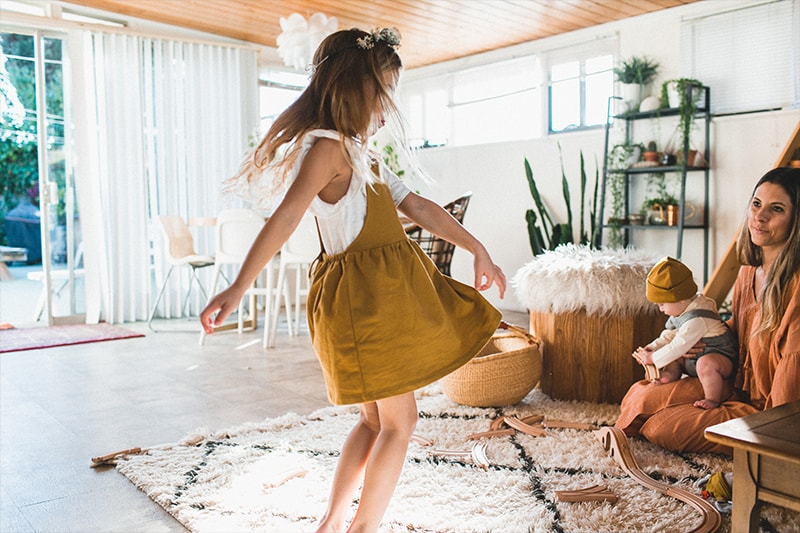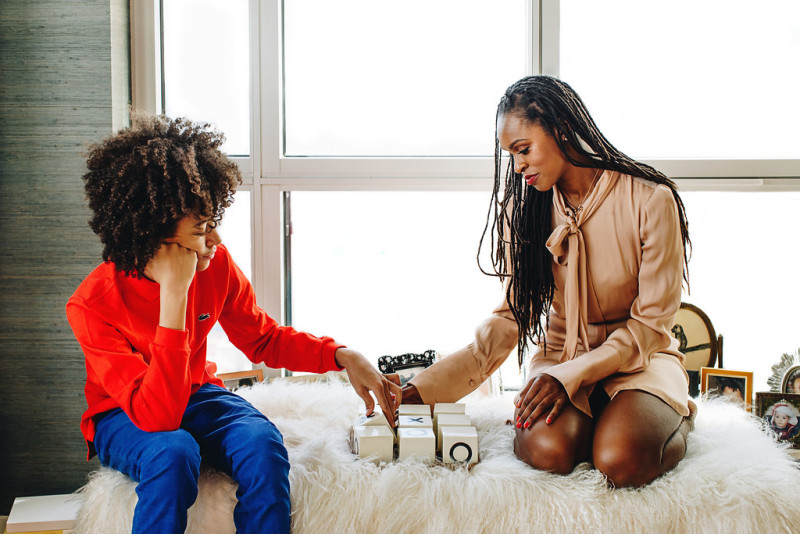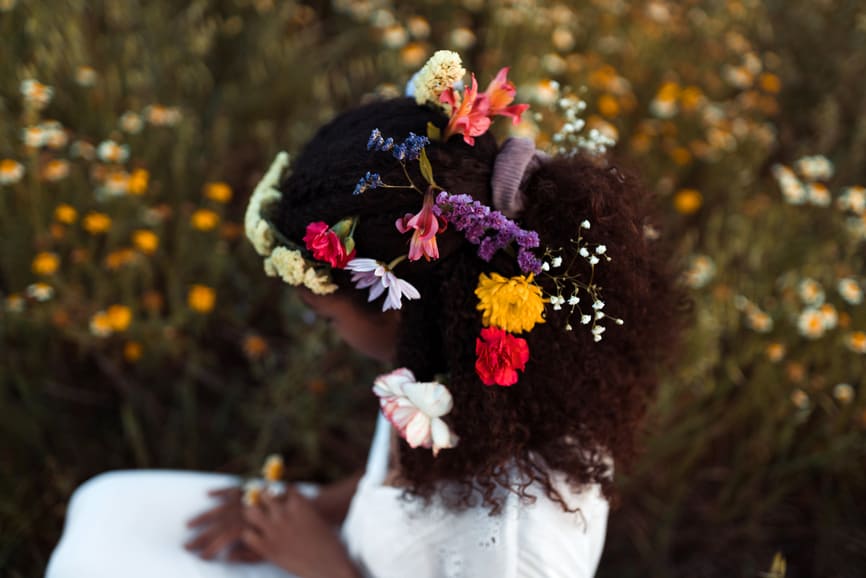
The Importance Of Going Green—For Baby And Beyond
Written by Katie Hintz-Zambrano
Photography by Photo Via Rachel Castillero For Noble Carriage
When a person becomes a parent, that’s often when a healthier, cleaner lifestyle is kicked off—for both your baby and yourself. Of course, living a greener, more-organic life isn’t always the easiest switch. But to many folks, it’s a vitally important one. In celebration of Earth Day this weekend, we spoke with a handful of clean living advocates in fashion, beauty, food, and home, to learn exactly why going sustainable is essential to them. Plus, tips on which steps you can take in your own household today.
Gregg Renfrew, Beautycounter founder.
On the misleading “organic” beauty labels: “Organic in food must be USDA certified. In beauty it may mean that, but it does not need to because of lack of regulation. There are brands built on the word organic that aren’t.”
On eating organic: “What you eat and put on your body really matters. So, to avoid exposure to pesticides and other harmful chemicals, eat organic food whenever possible and read the labels on your personal care. You can download our Never List to shop the market.”
On what she and her family do to stay clean and green: “As a family, we use all clean household cleaners and some we make ourselves, we do not microwave or use plastic food containers or non stick pans, we avoid food dye and heavily processed foods. And shoes come off at the door!”
On the best first steps you can take today: “Go for fragrance-free everything. Follow EWG dirty dozen for produce. Take your shoes off at door. Use water and vinegar to clean. Swap plastic for glass.”
Jen Hartford, Noble Carriage founder.
On the dangers of non-organic cotton: “I am very passionate about environmental sustainability. The current method of farming cotton with the use of pesticides is not environmentally sustainable. Conventional cotton (plain ol’ cotton) uses more insecticides than any other crop in the world. Not only do these chemicals make their way into our non-organic t-shirts, but they also enter our food chain through our water supply, as well as foods containing cotton seed oil (like peanut butter, crackers, bread, etc.). These chemicals can cause cancers, neurological problems, reproductive problems, and more. This negatively affects the end consumer, and is killing farmers and the environment. Here in the U.S. alone, more than 10,000 farmers die each year from cancers related to these harmful pesticides. If investing in organic cotton right now is going to keep my family, farmers, the environment, and the end-consumer healthy, then I can’t find any reason to not make that investment.”
On why organic clothing for babies and kids is so key: “Conventional cotton is responsible for 25% of the insecticides and 10% of the pesticides used worldwide. There are dozens of pesticides used on cotton crops and about half of them have been named as possible or probable carcinogens by the EPA. Just like you wouldn’t voluntarily rub chemicals on your baby’s sensitive skin, you wouldn’t want to place them against your baby’s skin all day long. Organic clothing is free of harsh chemicals that could irritate your baby’s skin. Organic cotton plants also make stronger yarn, which means more durable fabric that actually holds up wash after wash. It also happens to be unbleached, untreated, and unbelievably soft. If that isn’t reason enough, here are 8 more reasons to love organic baby clothing, straight from Noble Carriage.”
On her green(er) home life: “I believe living a healthy and organic life is all about balance and finding what works best for you and your family. For us, it’s been slowly swapping toxic products out for non-toxic products. When it comes to food, we keep the dirty dozen top of mind and do the best we can to avoid any processed foods. When we moved to our home in San Diego, we opted for a less is more approach. We don’t have a ton of furniture or stuff, and instead use the money we saved to purchase organic bedding, non-toxic plants, and hire green house cleaners to make sure our home is kept clean with natural cleaners. We also have our windows open to keep the natural air flowing throughout the house. We sacrifice quantity for quality when it comes to clothing. To be honest, my wardrobe is made up of mostly vintage clothing (which has little to zero chemical residue left on them), and I invest in organic or sustainably made clothing when my budget permits. I’m currently beginning to swap out for clean beauty with the help of my friend at Good Life. This was long overdue, but like I said before, healthy living is a journey.”
On where new parents should start: “Start with the things that would give you the most benefit and where your budget allows. If you are starting from scratch with a new baby, start with an organic crib mattress. We spend 1/3 of our lives sleeping and our babies sleep on a mattress for 10-20 hours a day, during their most fragile developmental years. With each sleep, they are lying directly on the mattress, breathing in and absorbing the chemical off-gassing produced by the majority of mattresses. Switching to an organic or natural mattress is an easy way to reduce chemical exposure. If you aren’t starting from scratch and can’t buy a new mattress, consider the sheets and sleepwear. If you want to take it a step further, purchase a small capsule wardrobe of 7-10 pieces for your little. You will notice that the organic clothing will hold up better in the wash and will last you much longer. Bonus: less laundry!”
Michelle Davenport, Raised Real co-founder.
On the lightbulb going off: “I had always taken an interest in health, and when I started studying physiology in college, I learned most chronic diseases were caused by diet and environment. So, I went on to get my PhD in Nutrition at NYU, trained as a registered dietitian at UCSF, and never looked back. But it wasn’t until I became a mom, and held this tiny person whose development so greatly depended on every morsel I fed her that the lightbulb truly went off on the importance of organic food. And that’s why I started Raised Real, to help parents make homemade baby food with organically-sourced ingredients.”
On the dangers of not eating organic: “Organic food contains toxic chemicals from pesticides and fertilizers that have been associated with obesity, diabetes, hormonal problems, birth defects, and various cancers. In babies and small children whose small bodies can’t filter the toxins as well as adult bodies, the buildup of these chemicals over time may significantly impact their development. It wasn’t a risk I wanted to take with my own daughter, so it was a no-brainer for us when we chose to only work with certified organic farms at Raised Real.”
On her family’s green ways: “We eat organic whenever we can (we stick to the dirty dozen), use clean label cleaning and personal products, got rid of mattresses with fire retardants or memory foam, and make sure anything plastic, like my daughter’s toys or utensils, are BPA-free.”
On the best first steps you can take today: “Start with the items that you are in most contact with, like food. By sticking to the dirty dozen list, you’ll find that not every ingredient has to be organic (like avocado). But most importantly, don’t stress if you can’t eat organic 100% of the time. It’s what you do most of the time that counts.”
Lauren and Josh Podoll, The Podolls founders.
On when the lightbulb on organic clothing went off: “At home we have always tried to buy organic foods, so it felt like a natural choice to use organic cotton tees when we started our graphic t-shirt business in 2003. Over time we have accumulated knowledge about sustainability in the apparel business and we have tried to incorporate these ideas into how we make our clothes. First of all, we feel that to be truly ethical and sustainable we have to treat the people who make our clothes fairly and with respect. That means comfortable, safe working conditions and a living wage. We also feel it’s important to reduce the fossil fuels that are consumed in transporting clothing and materials around the world—for this and other reasons we believe it’s a great choice for us to manufacture our clothing in local factories. Finally, we are firmly opposed to ‘disposable’ clothing, so we make essential, classic, quality garments out of natural fibers that will last and not end up in a landfill at the end of the season.”
On the dangers of not wearing organic: “We like to compare fast fashion to fast food. Most of us are aware by now that cheap, GMO ingredients are used in processed foods and that they pose health risks to our bodies and our environment. Therefore many of us have chosen to pay more to purchase organic foods because we can justify the additional cost. What many don’t know is that the apparel industry is the second largest polluter in the world, just behind oil. When you purchase cheap clothing from mass retailers, you’re supporting the exploitation of underpaid workers, condoning irresponsible practices like contaminating water supplies with toxic dye run-off, and ultimately contributing to the accumulation of excessive waste. When you shop at fast fashion retailers, you’re thinking short term and not about the implications of what your purchase supports.”
On a green(er) family life: “We’re not perfect, but we try. We are thoughtful about our purchasing and support sustainable companies and local makers. We buy and sell on Craigslist so things can enjoy several owners. We eat organic and local produce. We grow veggies in the backyard to help our kids learn about how food is grown and to eat a variety of plants. One thing we would like to work on is becoming less dependent on driving. Just because we have a fuel efficient car, it doesn’t excuse the habit when other modes of transportation are available. Recently we started a new tradition of ‘Screen-Free Sunday,’ so once a week we all unplug and have fun in nature, on a hike or at the beach. It helps us all reset our physiology, appreciate a slower pace, and enjoy quality time together.”
Their advice for parents trying to live greener: “Start with something small that’s not too hard and involve the whole family. One idea is to begin a family ritual of shopping at a local farmers’ market on the weekend or subscribe to a CSA. Gardening is great, but if you don’t have the space, perhaps join a local community garden. Maybe start a clothing and toy swap with some other families so you can maximize the lifespan of quality kids’ clothing and handmade toys. Or start composting, so the kids learn how to sort waste—compost vs. recycling. Another idea is to commit to packing waste-free lunches for the kids. Use a metal bento box and reusable snack containers to minimize daily plastic use. The most important step is becoming more aware. Educate yourself about the products you purchase and make conscious decisions. Ask where and how things were made, weigh the convenience or initial cost savings with the environmental implications, and try to consume less. If you have a sincere intention to live greener, that is the first step toward actually making it a reality.”
Shauna Sadowski, Annie’s Sustainability VP.
On the importance of kids (and adults) eating organic: “Organic is important for everyone, and especially for young children who are rapidly growing. By their weight, children eat more food and drink than adults, which means that what is in (and not in) their food matters even more. Studies have shown the negative effects on children’s health, including brain development, from exposure to chemicals. By choosing organic, I am more confident that a rigorous process is behind how the food is grown, including avoidance of most synthetic pesticides and fertilizers. And in addition to avoiding these toxic chemicals, I know that organic farmers are also working to improve the soil, water, and biodiversity around them. For me, I also care about the future of our planet, which is also important for kids, who are our future! So, this is yet another reason to choose organic.”
Advice on living a green(er) life: “There are so many ways to incorporate green principles, from buying less stuff to conserving water and energy at home. But one of the biggest things you can do is know more about where your food comes from and how it’s grown. Agriculture has a big impact on our planet and it’s oftentimes negative due to degradation of natural ecosystems and farming communities. But the good news is that there are alternative options and people can find these options in many places. Buying Certified Organic is definitely one of these better options. And you can take it further by asking questions about what you eat every day. Where is it grown? What do I know about its impact? And how might I choose differently to have a more positive impact? By taking some simple steps, like visiting a farmers’ market or even visiting a farm, you can learn a lot more about how food is grown and what you can do to make greener food choices.”
On packaged food: “As a busy working parent, I can appreciate the need for convenience. In my household, we subscribe to a weekly CSA (community supported agriculture), which means that my husband and I spend time doing meal plans each week to ensure we’re using that CSA and supplementing it with good foods from the perimeter aisles (dairy, meats) and the inner aisles (packaged foods). And of course, we’re a household that loves Annie’s! I know that when I feed Annie’s to my family, there is rigor in how the food made it to the shelf—from the organic standard behind it, to choosing trusted suppliers, to the quality control measures to ensure it’s safe to eat. Combining better-for-you packaged foods with whole foods is what we choose to do in my family. And I feel great about it!”
On choosing “organic”: “I know how challenging it can be to work within a budget, and it’s true that oftentimes organic foods cost more. The last thing I would want is for someone to feel guilty about their purchases. So, I encourage people to buy whole foods, when possible, and choose organic for those items where exposure is highest (see the dirty dozen list from EWG). Also, there are many ways to make organic more affordable, including planning meals, flexibility on what you buy, and limiting the purchase of the most expensive items (like meat). My friend Amelia has a great blog post on how to buy organic on a budget.”
On GMOs: “I believe that the more we know about what’s in our food, the more informed choices we can make for ourselves, our family, and our planet. Labels are a good starting point for information, but we need to dig beyond the label to get to more information on the impacts those foods have on people and the planet. With regard to GMOs, they are often touted as a way to ‘feed the world,’ but I don’t believe they are a silver bullet. I wrote on this topic a few years ago.”
On climate change: “There is some super exciting research coming out now on the role of agriculture in helping to address climate change. With a problem as large as climate change, it can sometimes feel daunting as a single person to know how best to address it. But the good news is that there are some really innovative people doing amazing work in the field right now—literally in the farming fields—to figure out how healthy soils can play a positive role in addressing climate change. Paul Hawken just released a new book on the topic, Project Drawdown, and I hope everyone has a chance to read it. It gives great hope for a better future.”
Share this story



